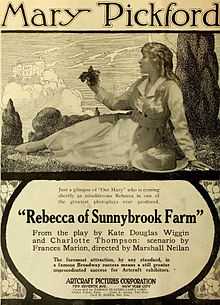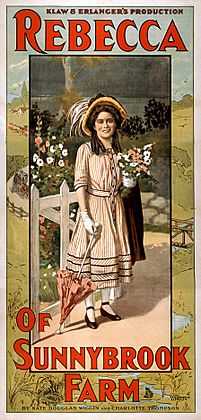Rebecca of Sunnybrook Farm
 | |
| Author | Kate Douglas Wiggin |
|---|---|
| Country | United States |
| Language | English |
| Genre | Children's novel |
| Publisher | Houghton Mifflin |
Publication date | 1903 |
| Media type | Print (Hardback |
| OCLC | 4738229 |
Rebecca of Sunnybrook Farm is a classic American 1903 children's novel by Kate Douglas Wiggin that tells the story of Rebecca Rowena Randall and her two stern aunts in the fictional village of Riverboro, Maine. Rebecca's joy for life inspires her aunts, but she faces many trials in her young life, gaining wisdom and understanding. Wiggin wrote a sequel, New Chronicles of Rebecca.[1] Eric Wiggin, a great nephew of the author, wrote updated versions of several Rebecca books, including a concluding story. The story was adapted for the theatrical stage, and was filmed three times, once with Shirley Temple in the title role.
Synopsis
The story opens with Rebecca's journey to Riverboro, to live with her two aunts, Miranda and Jane Sawyer. Until this time, she has lived on the family farm. Rebecca is the second eldest of seven children. Most of the children have fanciful names, such as Marquis and Jenny Lind, influenced by the father's artistic background (Rebecca is named after both the heroines in Ivanhoe). The family is quite poor, due to the number of children, Mr. Randall's inability to stick to a job, and the farm being mortgaged. At the beginning of the novel, he has been dead for three years and the family are barely scraping by. Therefore, Rebecca's stay with her aunt is both a chance to improve her opportunities in life and to make things easier, as there is one less mouth to feed. Despite her impoverished background, Rebecca is an imaginative and charming child, often composing little poems and songs to express her feelings or to amuse her younger brothers and sisters. It is she who names their farm "Sunnybrook".
Miranda and Jane had wanted Hannah, the eldest sister, due to her pragmatic nature and household skills, but as these skills are also greatly valued by her mother, Rebecca is sent instead. Miranda is unimpressed by Rebecca's imagination and sallow complexion, saying that she is the image of her shiftless father, Lorenzo DeMedici Randall. Miranda determines to do her duty and train Rebecca to be a proper young lady, so she will not shame the Sawyer name. Jane takes on the role of Rebecca's protector, acting as a buffer between her niece and her sister, and teaches Rebecca to sew, cook and be a proper little housekeeper. In return, Rebecca's liveliness and curiosity brighten Jane's life and refresh her spirit. Although Rebecca strives to win Miranda's approval, she finds it hard to live up to the older aunt's high standards, as she has to fight against Miranda's view of her as "all Randall and no Sawyer".
The middle part of the novel is taken up with describing the life of Riverboro and the people who live there. Important characters include Jeremiah Cobb, who is the first resident to encounter Rebecca and be charmed by her; Sarah Cobb, his wife; Rebecca's best friend, Emma Jane Perkins, and Adam Ladd, a young businessman, who first meets Rebecca when she and Emma Jane are selling soap for charity. Rebecca nicknames him "Mr Aladdin," because he gave her and Emma Jane a lamp as a present.

Rebecca proves to be a good student, especially in English, and goes on to attend the high school in Wareham. During the last part of the book, she matures into a young lady, but still retains her high spirits and develops her talent for writing. She applies for a teaching place at Augusta, but her mother falls ill and Rebecca has to return to take care of her and the farm. While Rebecca is away from Riverboro, Miranda dies, having willed the Sawyer house to Rebecca. A railway company will buy Sunnybrook Farm in order to build on the land, giving the Randall family enough to live on. Thanks to Miranda's will, Rebecca now has enough money to become an independent woman and help her brothers and sisters. The novel ends with her exclaiming, "God bless Aunt Miranda! God bless the brick house that was! God bless the brick house that is to be!"
Adaptations
Play
Rebecca of Sunnybrook Farm was dramatized for the theater in 1909. Wiggin co-wrote the play with Charlotte Thompson. It was produced for Broadway by Klaw & Erlanger in 1909.[2] Before opening on Broadway, it toured Boston and New England where it was warmly received.[3]
Film
The story was filmed three times. Shirley Temple played Rebecca in the more freely interpreted adaptation of 1938.
- Rebecca of Sunnybrook Farm (1917 film)
- Rebecca of Sunnybrook Farm (1932 film)
- Rebecca of Sunnybrook Farm (1938 film)
Cultural references
- Becky Randall appears as a character in The League of Extraordinary Gentlemen by Alan Moore and Kevin O'Neill.
- In the first season episode of Melrose Place, "Pas de Trois", Alison complains how her colleague Amanda views her as "some kind of Rebecca of Sunnybrook Farm", as an example of an innocent, inexperienced young woman.
- The Japanese band Rebecca takes its name from this novel.
- In an episode of That's My Mama titled "Clifton's Dubious Romance," Clifton's girlfriend has not been honest about her sordid past and he claims she passed herself off as Rebecca of Sunnybrook Farm.
- In an episode of The Golden Girls,"Blanche's Little Girl", Rebecca's fiance Jeremy was upset because they were running late getting to the airport, and she was taking too long to say good-bye; he enters the house to say, "Look, I know things run a little slow here at Sunnybrook Farm, but we do have a plane to catch", using the significance of the name, "Rebecca".
- In the Nancy Drew computer game "The Secret of the Old Clock," Nancy must deliver a telegram to "Miss Jane," referring to Rebecca's aunt Jane, at Sunnybrook Farm. When Nancy drops off the telegram, a young girl who introduces herself as Rebecca promises to give it to Jane.
References
- ↑ New Chronicles of Rebecca, Kate Douglas Wiggin, Houghton, Mifflin and Company, The Riverside Press, Cambridge, April 1907, copyright 1906 and 1907 by Charles Scribner's Books, copyright 1907 Kate Douglas Wiggin, reprinted in June 1986 by Buccaneer Books, ISBN 0-89966-572-1.
- ↑ "PLAY FROM ‘REBECCA’ BOOKS.; Klaw & Erlanger Produce "Rebecca of Sunnybrook Farm"" (subscription). The New York Times. November 17, 1909. p. 11. Retrieved 2007-06-13.
- ↑ Burbank, Emily M. (October 22, 1910). "REBECCA OF SUNNYBROOK; How Kate Douglas Wiggin Was Induced to Turn Her Enormously Popular Books Into a Play" (subscription). The New York Times Saturday Review of Books. p. BR1. Retrieved 2007-06-13.
External links
- Rebecca of Sunnybrook Farm at Project Gutenberg
- Wiggin, Kate Douglas (1995). Rebecca of Sunnybrook Farm (reissue ed.). Puffin. ISBN 0-14-036759-4.